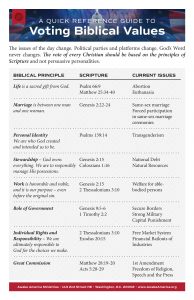Here is a helpful resource from Awake America Ministries that provides Scriptural principles to help Christians make Biblically-informed choices at the ballot box.

Author: admin
![]()
About admin
Posts by Aaron Francis:
Who Gets the Credit?
When God does a great work in our life, who gets the credit? When we have some great spiritual victory, do we step forward to receive the credit or do we bow our heads in gratitude to the One who really deserves the credit?

In Ezra chapter 6, we find the description of the completion of the Temple in Jerusalem. Much work had gone into this project before it was finally completed and ready for dedication. A great feat such as this called for a great celebration amongst the Jewish people. However, the Jewish people were very wise to realize that this great feat was accomplished, not because of themselves, but because of God. God is the One who had given them strength and supplies to construct the Temple. The Jews recognized this and focused their celebration, not on themselves, but on the Lord. Verse 17 which says that the Jews “offered at the dedication of this house of God an hundred bullocks, two hundred rams, four hundred lambs…” This was truly a celebration of gratitude for the blessings of God! Their gratitude to God led them to a deeper level of dedication and worship to the Lord. This was seen in the Jews’ observance of God’s law, giving of sacrificial offerings, installment of religious leaders, the keeping of the Passover, and in separating themselves “from the filthiness of the land” (v. 21). At the end of the day, God received the credit, honor, and glory! When God is recognized for who He is and what He has done, it will bear the fruit of joy, dedication, and true worship.
In Psalm 44, the Psalmist recounted how the previous generation had relayed to him the great acts of God on their behalf- “How thou didst drive out the heathen with thy hand, and plantedst them; how thou didst afflict the people, and cast them out” (v. 2). The writer of this Psalm realized that the Israelites did not possess the Promised Land “by their own sword”, nor by “their own arm”, but by God’s “right hand, and…arm” (v. 3). This God-directed confidence that the Psalmist received from hearing about the feats of God’s intervention in the past, had a profound impact up his own life. This can be seen in the Psalmist’s words in verse 6-8a: “For I will not trust in my bow, neither shall my sword save me. But thou hast saved us from our enemies…In God we boast all the day long…”.
In God’s service, there must not be a misappropriation of credit. It is God that gets the credit for the great things He has done! Are we praising God for our victories? Are we passing on the reality of God’s working in our lives to the next generation so that they too will give God the credit and glory He alone deserves? As we reflect on past victories and look forward to future victories, may we boast in the Lord all the day long!
~Pastor Aaron Francis
admin / Uncategorized / 0
The Attitude of Anticipation
This time of the year is marked by great anticipation! Through the month of December, many lived in anticipation counting down the days until Christmas. Now that Christmas is behind us, there is the anticipation of a new year and new opportunities that lie ahead in 2024. Yet, each year as these events come and go, the anticipation is short-lived and temporal. Sometimes the excitement of anticipation is met by disappointment of reality.
Yet, for the believer in Christ, there is an anticipation that is not merely temporal, short-lived, or met by disappointment. This is the anticipation of the return of Jesus Christ. In Revelation 22, Jesus reminds us of an event that we ought to anticipate every day of every year! Jesus reminds us that this event will usher believers into an eternity of enjoying God’s very presence. Jesus assured us of our future and gave us a great hope when He said: “Surely, I come quickly” (v. 20). What hope that promise should bring to the heart of every believer. Christ isn’t promising us a mere temporal and passing moment of happiness that comes and goes like Christmas or New Years. Rather, Christ is directing our hearts towards His imminent return! This great promise was given over 1,900 years ago, yet His coming has been imminent to every generation of believers. In reality, 1,900 years is not very long in the scope of eternity. As 21st century Christians, we should be even more ready, and we should be even more watchful for His return than previous generations.
Notice, however, the response of John in the book of Revelation. John responds from the overflow of his heart with a longing for the return of Christ. He said, “Even so, come, Lord Jesus” (v. 20). This longing for the return of Christ is the heart cry of every true believer. As pilgrims passing through this world, we look “for a city which hath foundations, whose builder and maker is God” (Hebrews 11:10). Our attitude should not be one of desperately clinging to the soil of this earth as if we will live here forever. Rather, our attitude ought to be one of anticipation. We ought to be looking forward to the coming of Christ!
I believe that this anticipation only grows in the heart of the Christian the longer they journey through this barren wasteland of a world that is filled with troubles and trials. The hope of the Christian is not some passing festivity that comes and goes once a year. Rather, the hope of the Christian is an eternal and sinless abode with God. May we ever be watchful and may our hearts continually cry out, “Even so, come, Lord Jesus.”
~Pastor Aaron Francis
admin / Uncategorized / 0
Thy Way, Not Mine, O Lord
Thy way, not mine, O Lord,
However dark it be;
Lead me by Thine own hand,
Choose out the path for me.
Smooth let it be or rough,
It will be still the best;
Winding or straight, it leads
Right onward to Thy rest.
I dare not choose my lot;
I would not, if I might;
Choose Thou for me, my God,
So I shall walk aright.
Take Thou my cup, and it
With joy or sorrow fill,
As best to Thee may seem;
Choose Thou my good and ill.
Choose Thou for me my friends,
My sickness or my health;
Choose Thou my cares for me,
My poverty or wealth.
The kingdom that I seek
Is Thine: so let the way
That leads to it be Thine,
Else I must surely stray.
Not mine, not mine the choice
In things or great or small;
Be Thou my guide, my strength
My wisdom, and my all.
admin / Uncategorized / 0
Family Resemblance
One of the most anticipated parts of a baby being born is seeing who the child resembles! Some children strongly resemble their father while others strongly resemble their mother. Some children resemble both father and mother and are a balance between the two. A child of physical descent can be expected to resemble its parents in some manner. While this is true in the natural realm, this ought also to be seen in the spiritual realm. A child of God, who has believed on Christ and been born of the Spirit of God, can and should resemble their heavenly Father. There ought to be a family resemblance.
In 1 Peter 1:14-16, the Bible says, “As obedient children, not fashioning yourselves according to the former lusts in your ignorance: But as he which hath called you is holy, so be ye holy in all manner of conversation; because it is written, Be ye holy; for I am holy.” Our Heavenly Father is a holy Father. Holiness is God’s chief attribute. Every other attribute of God flows through his holiness. His love is holy. His mercy is holy. His wrath is holy. God is the purest of pure. He is the holiest of holy. He is set apart from sin and all defilement. And God calls us who are in the family of God to resemble His character in our daily lives.
God never extends grace to the sinner and leaves him in his sin. Rather, He stoops down to the lowest sinner, extends His saving grace, and commands him to “go, and sin no more” (Jn. 8:11). God’s grace reaches to the lowest of low, but God never leaves the sinner in his sin. God always saves with the purpose of sanctifying. God calls us into His family and expects us to begin bearing family resemblance as we strive to be holy as God is holy.
We are not to fashion our lives “according to the former lusts in ignorance.” Before salvation, we gave ourselves up to the lusts of our flesh. After salvation, however, we are to begin the pursuit of holiness. We are not to form or model our lives according to the dictates of culture, but rather, the character of God. To be like Christ is our greatest pursuit. And to pursue Christlikenss is to pursue holiness. Christ was “holy, harmless, undefiled, separate from sinners” (Heb. 7:26). To be like Christ, is to be holy. It is to be set apart from sin. It is to be “unspotted from the world” (Jms. 1:27). It is to be separated unto Christ.
Our goal should not be to resemble the culture in which we live. Rather, our goal should be to resemble the God in whom we have the hope of eternal life. A preacher once said, “we live in a day when we are more afraid of holiness than we are of sinfulness.” This ought not to be. We should strive to be like Christ. For when we are like Him, holiness will be the result.
~Pastor Aaron Francis
admin / Uncategorized / 0
Is Sincerity Enough?
What kind of worship and service pleases God? Are good intentions enough? Is sincerity all that God is looking for? Many people in society today mistake sincerity for reality. Many believe that if you are sincere, it doesn’t matter what you believe or how you behave. And although many people [even professing Christians] have bought into this type of thinking, the reality is that you can be sincere and be sincerely wrong at the same time. And we must be on guard against the idea that “sincerity alone” is all that matters in service and worship to God. Sincerity is vitally important only when it is connected with obedience to God’s Word.
When one reads 1 Chronicles 13, it becomes apparent that God is concerned with more than sincerity alone. This passage tells us that David had a sincere desire to bring the Ark of the Covenant from a town called Kirjath-jearim back to the city of Jerusalem. David had a desire to reestablish the worship of God in the city of Jerusalem. This was a good desire that David had. However, when David went to fetch the Ark of the Covenant, the Bible says that “…they carried the ark of God in a new cart out of the house of Abinadab…” (1 Chron. 13:7). What’s the problem? David’s desire was good and his actions were sincere. That is unmistakable! Was David sincere? Yes. Was he obedient? No. God had specifically told the Israelites that the ark was to be carried only on the shoulders of the priests.
Later in the passage, we find that as the Ark was being transported “…Uzza put forth his hand to the ark; for the oxen stumbled” (1 Chronicles 13:9). The oxen stumbled that were pulling the Ark and the Bible says that Uzza reached out his hand to steady the Ark. What’s the problem? Surely Uzza was sincere when he reached out his hand to steady the ark. Was Uzza sincere? Yes. Was he obedient? No. This act was strictly forbidden by God. No human hands were allowed to touch the Ark. Numbers 4:15 says, “…they shall not touch any holy thing, lest they die.” Uzza made a split-second decision to disregard God’s clear command in favor of what seemed right to him and the Bible states that God became angry with him and “…smote him, because he put his hand to the ark: and there he died before God” (1 Chronicles 13:10b). We are reminded here that good intentions do not justify disobedience to God’s clear commandments in His Word.
God was not pleased with the ‘sincere’ worship and good intentions of the Israelites. God was pleased, however, when the Israelites offered up worship and service in both sincerity and obedience to God’s Word. Sincerity in worship or service must never be divorced from obedience to God’s Word. Sincerity and obedience to God’s Word must always be married together.
This passage reminds us that in our worship and service to God, good intentions and sincerity are not enough! Sincerity and obedience to God’s Word are vital for true worship! In John 4:24, Jesus made this clear- “God is a Spirit: and they that worship him must worship him in spirit and in truth.” God is to be worshipped ‘in spirit’ [sincerely] and ‘in truth’ [Scripturally]. God desires more than sincerity. God desires Scriptural worship and service. He desires His work to be done in His way! The worship of God must be from the sincerity of our hearts and according to the sufficient Word of God.
admin / Uncategorized / 0
The Watchman
By Scottish pastor, Horatius Bonar (1808-1889)
*The following is a reminder that in these spiritually dark days, God is still raising up watchman to lift up their voices like a trumpet and expose “the unfruitful works of darkness” (Eph. 5:11) and point people back to the Word of God. Although their message is often ignored or rejected, a true watchman is willing to courageously speak the truth in love regardless of how it is received by those around him. Consider the timely words of a Scottish preacher in the 19th century who gave the call to Christians to be the ‘watchman on the wall’ in every generation:
Thy way, not mine, O Lord, however dark it be;
Lead me by Thine own hand, choose out the path for me.

“…if the watchman see the sword come, and blow not the trumpet, and the people be not warned; if the sword come, and take any person from among them, he is taken away in his iniquity; but his blood will I require at the watchman’s hand. So thou, O son of man, I have set thee a watchman unto the house of Israel; therefore thou shalt hear the word at my mouth, and warn them from me.” (Ezekiel 33:6-7)
“Some one, then, must undertake the ungracious task of probing and laying bare the evils of the age; for men must not be allowed to congratulate themselves that all is well. If others will not, He will.
If others shrink from the obloquy of such a work, he will not…. he loves his fellow-men too well. They may upbraid him; they may call him a misanthropist, or a prophet of evil; they may ascribe his warnings to the worst of motives, such as pride, or arrogance, or self-esteem, or malice, or envy; but he will give no heed to these unjust insinuations.
He will prefer being thus misunderstood and maligned, to allowing men to precipitate themselves upon a ruin which they see not. Rather than that they should perish, he will allow his own good name to be spoken against. He will risk every thing, even the hatred of brethren, rather than withhold the warning. If they give no heed to it, he has, at least, saved his own soul. If they do, he has saved both his own soul and theirs.
He would rather take up the glad tidings of peace, and tell men of Him who came the first time for shame and death, and who is coming the second time for glory and dominion; but he feels as one who has a special and personal message to deliver, which cannot be postponed.
He must remember that he is a watchman; and, having seen danger pressing on, he must not hesitate to make it known. He must speak his message of forewarning and rebuke, sparing no arrows, and neither smoothing down nor hiding any form of sin, but laying his finger upon every sore, and beseeching men to turn from their ungodliness. The evils around him press upon him sadly; the coming evils are foreshadowed upon his spirit, and, therefore, he lifts up his voice like a trumpet.
Satan has many snares which need to be detected; the world has many spells and lures which must be disenchanted; religion has many guises which must be unmasked, many devious paths of inconsistency which must be pointed out, many cherished errors which must be condemned, many carnal taints which must be abhorred and shunned. All these he must protest against without fear or favour.”
admin / Uncategorized / 0
The Forgotten Beatitude
1 Thessalonians 5:16-18- “Rejoice evermore. Pray without ceasing. In every thing give thanks: for this is the will of God in Christ Jesus concerning you.”
Instead of counting our burdens, we ought to cultivate an attitude of counting our blessings! True faith rejoices in Christ not only in good times but even during difficult times. Consider the wise words of the preacher Vance Havner (1901-1986) who preached on what he referred to as “The Forgotten Beatitude” based on Matthew 11:6- “And blessed is he, whosoever shall not be offended in me.”
Consider an excerpt from his timely sermon:
“It is nothing new to be offended in Jesus. More people have been offended in Him than in any character in history. . . . We have murmured that we pray and do not receive. We gave our tithe and now we are in adversity. We were faithful to the Lord’s house and landed in a hospital. We prayed for our children and they became worldlings. We craved joy and peace but we are despondent. Across the street is an ungodly family that has suffered no loss, while our dearest was taken. “There is no use in praying. It reads very lovely in the devotional books but I seem unable to make it work.” We were in distress, and the Lord “abode where he was” and when He did appear we grumbled. . . . All such grumbling means that we have not learned the Forgotten Beatitude. Anybody can believe during fair weather. There is a deeper experience and a higher state which not many reach, a state in which, no matter what happens, we are never offended in the Lord, a state in which, whether it makes sense to us or not, we still believe Romans 8:28. Habakkuk started his book pouting and ended it praising. And blessed is the man who can say: “Though I don’t get what I want; though I may sow much and reap little; though others get the plums and I get the sack, I will rejoice in the Lord, I will be joyful in the God of my salvation.”
Source: Vance Havner, “The Forgotten Beatitude” (articles.ochristian.com/article10714.shtml).
admin / Uncategorized / 0

